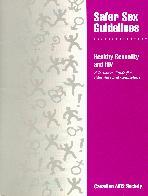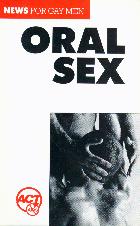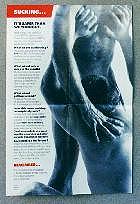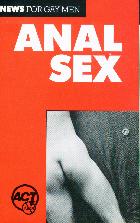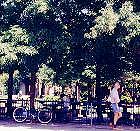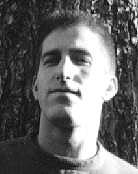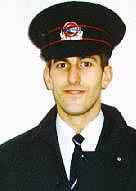|
Promiscuous Affections A Life in The Bar, 1969-2000
1987-1991:
|
|
That question again...
|
Did safe-sexperts never desire to do their list of "don't"? Were they all tops? Or vengeful bottoms? (If I can't do it, honey, neither can you!)
1989
July through December
When I was working on "Is There Safe Sex?" in 1983, I'd found I had trouble with the very concept. As I later said to Neil Bartlett: "What's safe might not be sex to you."
Particular sex acts can have deep meaning, a meaning ignored in blasé "don't do that, why not try this?" advice.
Don't swallow semen (though you deeply want that man's essence inside you). Don't let him shoot up your bum (even as you're moaning inside, "Come in me, come in me!"). Don't suck without a rubber (as if latex could taste like a man). Don't snort poppers (even as incense and aid in that sacred moment when he's deep in you, or you deep down on him, all the way to his pubic hair).
Did safe-sexperts never feel such desires? Were they all tops? Or vengeful bottoms? (If I can't do it, honey, neither can you!) I'd rather trust Cindy Patton's avid bottom boy: he knew the meaning of such sacrifices and wouldn't advise them lightly.
If advice givers did have such feelings they seemed not to value them, urging mere willpower to fend off profound desires.
They also tended to extreme caution: maximum limits will save more lives. Many of us had come to wonder if that approach hadn't cost lives. The more limited "safe" sex got, the more likely some were to shrug and go on with the sex they most wanted.
There are legitimate limits to the exercise of desire: you can't commit rape; you can't do willful harm. But we'd cast nearly all uncondomized sex as a form of assault, turning too many people into safe sex criminals likely stressed out and paranoid. We already knew what stress could do to the immune system.
***
|
Coherent guidance
|
In the 1994 revision & another in 1999, years of research had done nothing to change the verdict on cocksucking: low risk. And "low" meant very low.
In the fall of 1988, trying to challenge "Dither = Death," I pressed Ed Jackson to get new material out, specifically for gay men.
The moment was right: Ed was just about to get big information boards into bars, baths and other community venues, each with a rack for brochures. And we now had a firm basis for more coherent, less paranoid advice.
Earlier that year, after broad consultation with researchers and health workers and a deep dig in the medical literature, CAS, the Canadian AIDS Society, had released its Safer Sex Guidelines.
The guidelines set three levels of risk for HIV transmission: None; Low to minimal; and High. Case evidence had shown there was no middle level, no "maybe," no "probably."
In a 1994 revision "Low to minimal," still too vague, was split in two: "Theoretical only" -- the mechanics of transmission might seem to allow it in some acts (like kissing) but so far it had never happened; and "Low" -- it had happened, but very rarely.
The gap between "Low" and "High" was vast. Nearly all known cases resulted from high risk activity: unprotected fucking and IV drug use with contaminated works.
Into these risk categories the guidelines slotted every possible sex act between and among men and women. Having one's cock sucked fell under Theoretical; sucking with a condom, also Theoretical (it could break).
Sucking but not swallowing: Low; sucking and swallowing -- also Low.
In the 1994 revision (Ed wrote that one; Kevin had done the first) and in another in 1999, years of research had done nothing to change these assessments. Oral sex between men was a low risk act. And "low" meant very low.
Ed and I planned a series called "News for Gay Men," on oral sex, anal sex, drug use and sex, and HIV positive people and sex (that last for many mutually exclusive, people with HIV pariahs -- as if safer sex weren't all about the possibility that one or both partners might have HIV).
The last two fell to later dither but Oral Sex was out by late 1988, Anal Sex a few months later. Eddie, Kevin and I, the old crew, produced both.
***
|
Concise advice
|
Others picked up the campaign, even in the US. But American AIDS groups never agreed on safer sex. Their usual line: "On me, not in me" -- but "in me" by what route? Sucking got lumped in with fucking as high risk.
Gay men in America could want sucking to be unsafe -- so they could declare the glory days over, recalling them in satisfying grief, high elegy, banal melodrama.
They were a far cry from AIDS: Get the facts, apart from being clearly for gay men. First off, they were smaller: just three and a half by six inches, opening to seven by 11.
Posters for them were big, with matching images: an apparent blowjob (one man's head at another's crotch but you couldn't see what was going on; still, Xtra's printer refused to run it as an ad), and a man sprawled face down, a condom beside him on the sheets. On the brochures these and other images took up most of the space.
And that was the biggest difference: there were not thousands of words here but a few hundred. We had a grasp of literacy issues by then: these pieces could be understood by anyone with a Grade 6 education. For Get the facts it had been Grade 13.
You didn't even have to read the text to get the message: it simply offered evidence to explain the headings. Read in order they alone told the story. On Oral Sex:
- We used to think sucking cock was very risky. Now we have better information. It's safer than we thought. [Then the specifics.] What about swallowing? [We said why it was low risk.] What about getting sucked? -- As far as we know, no one has ever caught HIV from getting sucked. -- Does this mean sucking is completely safe? -- It's not impossible to catch HIV from sucking -- it's just very, very unlikely.
We said that cuts or sores in the mouth increased risk. We said that oral sex was a risk for other sexually transmitted diseases and said which ones -- but we did not indict the act as we once had rimming, for which we had long put HIV among those diseases as a "possible risk." In rimming it was not, and we said so.
***
But most important was the last bit. "So, is oral sex OK for me?" We didn't say yes. Or no. We said:
- Only you can decide that. If you'd feel uncomfortable sucking cock, then don't -- it would just be lousy sex. But if sucking is an important part of your sex life, you don't need to worry about it.
At last the meaning of sex to gay men was acknowledged as a legitimate guide to their actions. They could judge on their own what was or was not, for them, an acceptable risk -- just as they did in the rest of their lives.
This was of course, as in all of life, a much tougher call for high risk acts. The headings in Anal Sex:
- It doesn't matter whether you're fucking or getting fucked. Anal sex without a condom is very, very risky. [Even Oral Sex had made that reminder.] Pulling out before you come doesn't work. Douching after he comes doesn't work. [The text said why.] Condoms work. [There were the usual instructions on how to roll one on.] Condoms are worth it. Every time. Because he's worth it. And so are you.
That last bit I had come up with one night at The Barn: posters of engaging men, many of them but just one at a time, holding up a rubber; the sole text: "I'm worth it." But those never came to be.
***
Despite the evidence many people simply refused to believe that cocksucking could be low risk.
In AIDSupport, ACT's counselling wing and still mostly women, many were thrown by the change of tune even though they knew about the Safer Sex Guidelines. "You might have told us it was coming, boys" -- and the boys hadn't, Education and AIDSupport still two solitudes.
Even worse, in a 1991 report on a big survey, those guidelines might never have been written. One section compared gay men's perceptions of risk in certain acts with the opinions of 23 unnamed "experts." On oral sex and rimming, that anonymous crew had failed to achieve consensus. Their own, that is -- as if a raft of well identified researchers hadn't done so three years before.
With no comparison to offer, the report didn't even bother saying what gay men themselves had thought. I shot an angry memo off to its authors, two of them -- if not of that suspect section -- Ed Jackson and Kevin Orr:
- If any other Canadian organization had published a report in which the Safer Sex Guidelines were tossed aside in favour of anonymous 'experts' confused enough to suppress valuable data on community beliefs, we would have heard no end of the screaming at ACT. It is bad science, stupid politics, and lousy education. (No point mincing words here: we'd have all said this if anybody else had done it.)
This time ACT itself had done it, as co-creator and publisher of that report. I strongly recommended it be revised. It was not. This time deadlines mattered: it was a government funded projects and government deadlines were real.
***
The CAS Safer Sex Guidelines were later adopted in Spain. Australia and Britain developed their own, much the same; one British group went so far as to publish a very hot poster, the blowjob there more than implied and its caption just one word: "Suck."
AIDS Vancouver used Oral Sex and Anal Sex with no change but their logo in place of ACT's. Two US cities did campaigns giving the same advice, one verbatim.
But American AIDS groups never came up with a clear, stated consensus on safer sex advice. Their favourite snappy line was "On me, not in me." "In me" by what route remained vague, cocksucking implicitly lumped in with fucking as high risk. Most still told everyone to suck latex or suck nothing at all.
Even some very smart Americans bought the line. Later in the year I went to hear one of them, Douglas Crimp, give a lecture called "AIDS, Mourning and Militancy." Among the things he mourned was sex. He waxed dramatic in grief for a young friend -- not for his death, he was alive -- but because "he will never know what cum tastes like.
"And I mourn for myself," Douglas intoned, "because I do." To which I wanted to say: My dear -- will you please give the drama queen routine a rest?
Gay men in America could want cocksucking to be unsafe; could want their once glorious sex lives to be over -- so they could recall them in elegy, in richly satisfying grief. That they might still be able to have a sex life would ruin the script, putting at risk all that high, delicious melodrama.
I later wrote to Jane: "What can I say? It's not a soap opera, it's life. But then I do wonder at my life: there's certainly enough material for a soap, why hasn't it become one?
"No taste for melodrama, I guess. I'd make a disappointing American -- which is one reason I have chosen not to be one."
***
Monogamy could still be a state of sanctified ignorance.
Gay men in Toronto could borrow American doubts, in grief too but more often in overexposure to overcautious advice. In focus groups ACT did in November, most participants had seen Oral Sex. Many simply did not believe it.
Those groups, divided into four along two lines -- under 30 or older; with an ongoing lover or boyfriend, or without -- offered other insights as well. I told Jane about them.
-
There they were, 8 or 10 gay men talking together in one room, 2 or 3 of us [usually Kevin, Ed and I] in another watching from behind a one way mirror.
They're told someone is watching, they're told it's being taped, but once the discussion gets rolling they forget that and just talk (and occasionally preen in the mirror at the forgotten us). They're not told who is sponsoring the discussion until the end. ACT's efforts get judged alongside a lot of others without anyone feeling obliged to say nice things about us.
We've done this before. The groups were divided the same way then. But there were such differences now -- not only among the groups, but between 1987 and 1989.
Two years ago the men over 30 (especially single ones) seemed confident about themselves, safer sex and sex in general; the younger ones (even single ones) knew less and were less secure: educational material that was sexy made them nervous, they wanted romance.
This year the over 30s seemed tired, even cynical. It was the younger ones who seemed to have their act together, more optimistic, less afraid, more sexy.
There was a huge shift in what they wanted to know, a shift so obvious we named it even before the sessions were half over: Prevention vs Living with HIV.
"I don't need anybody else to tell me how to put on a condom, what's safe, what's not." "I need to know how to get help for my friends." "I need to know about services, treatments, new drugs." They wanted options, ways of coping with something that they now saw as part of their lives and the lives of those around them.
What didn't change was the contrast between unattached gay men and those in couples. In both age groups, both times, the coupled men knew less, were more likely to be having unsafe sex (with their lovers and sometimes even with other people) -- and were much more calculating rationalizers of what they did.
Monogamy can still be a state of sanctified ignorance, while, as Gerald quoted Douglas Crimp in a recent article, "promiscuity teaches." [Cocksucking aside, I suppose.] Not a universal truth of course: there were lovers into safe sex; there were unattached men who clearly didn't know enough about it.
But the generalization stands. (Much to my admitted chauvinist satisfaction; in a letter to Barry about this I said something he knew I'd say: being in a couple can stunt your growth.)
***
During Barry's first month in Tokyo his letters had been full of energy, touring all over the city. The tours were curbed on Randy's arrival. He too had got a job teaching English as a second language. They were still together if now at much closer quarters.
Barry's letters became dense with things barely said. Behind his usual line, "I'm fine" -- long familiar to me, Barry buying time to ponder his feelings -- there was much between the lines.
A letter dated July 16 went, in part: "Here I'm afraid there isn't much news. It's still the rainy season and today it's raining pretty heavily -- both inside and outside of the apt."
He was not talking about a leaky roof. "Randy has decided not to go to St John's with me upon our return. This 'break up' leaves me in somewhat of a bad position regarding my few possessions in Canada. I don't quite know how Randy's sister and brother in law will react and my jeep is sitting in their garage."
So they were roommates now, not lovers. Randy, adept at such categories, shifted easily into his new role: he went out by himself all the time. It was Barry who stayed home, waiting.
In a rare phone call I asked Barry how they were getting on. He said Randy was fine, he was the one with the problem. "So what's your problem?" I asked. "Oh, I'm just getting old."
Telling Jane about this (as ever), I said:
- Randy has always been good at setting conventional expectations of a relationship. Even if Barr doesn't agree with them he can feel obliged to meet them: they are not merely Randy's expectations; they're social ones, "sensible," "real."
In such quandaries Barr gets drunk, "irresponsibly" enough to justify his guilt at wanting "irresponsibility." And then Randy "sensibly" condescends to this latest slip, knowing he can use Barry's remorse to get what he wants.
What Randy does, in short, is take this good man and make him believe he's bad. Like all lovers (no, husbands) are bad.
Imagine: Barry struggling so hard for months not to give the definitive "No" he often wanted to; helping Randy cover his drug costs; letting Randy move in on a journey, a life, that at least in part Barry needed to have on his own -- and now Barry feels guilty.
***
In my letters to Barry I spent many pages reminding him how good I knew he was. I trod lightly about Randy but did encourage Barr to go out on his own -- and of course tell me all about it. My own bar tales were meant to inspire dirty thoughts.
- Sunday, August 20, 1989, midnight, to Barry:
After hours of work here I finally said at 9:45, "Aaargh! If you don't jump in the shower and get out of here you'll be very crazy in the morning!" So I did. And I went (where else?) to The Barn.
And it was (what else?) The Barn: one or two people to talk to (not counting some cute staff) and one nice man to watch dance. This one is Scott, and I've been watching him dance for ages. He's trim and round headed and blond and has an ass that -- especially in motion -- makes your mouth water. I've told him that. I've told him all kinds of things and he always smiles sweetly and gets a little strange.
A funny boy, a doctor now -- and he was only a medical student when I first caught him bopping his tiny bum on that very same dance floor -- someone I know I wouldn't hit it off with in the sack. (Rim fantasies are fine, but he's one of those boys I can be attracted to without even imagining he has a dick -- and where would that leave me? Doing all the work, I suppose.)
But my god, what a joy to watch him move. Off the dance floor too: he was with a new man he seemed to like a lot, and they'd find a corner and giggle and Scott would hump his little round ass and pump his hips into him. The boy has great flexibility in his lower back. Probably more than he has in the rest of his life.
Scott (I never knew his last name, so just Dr Scott) confused me not at all sexually, his bottom boy desires so obvious. But even that aside I'd long known he was best observed from afar. Behind his smile was a cynic.
Daddy had financed medical school; the skills he'd got there would not benefit his own community. "I would never practice in the ghetto," he told me once. "It gets too complicated."
Scott was no tourist, at The Barn all the time -- but in that sense he was: catered to by a world in which he had no commitment. In spirit, to me, that made him a tourist. If a delicious one to see.
***
|
"Thank god for the parks"
|
Some boys Barry heard about, I did get to bed.
- I found him in Cawthra Park at 2 am, a walk past, a hello, a turn around, hesitant -- you know how these things go. He was pretty drunk, had just got off work as a bartender at The Copa, where he knows how to drink behind the bar without anyone being the wiser.
So we found a picnic table and sat on it and talked. He was flipped out that I worked at ACT ("That's just weird for me") but it let me tell him I was HIV+ -- always a hard thing to work into a pickup routine. But he came back anyway, needed to pee.
He peed, had some gin, got more maudlin, positively strange. "This is all too much, really, I should go," he'd say, but he never made a move to go. He meant: I want to stay; make me stay. And I said: Go. If you want to go, go. I've liked this, I won't be offended.
But instead he leaned over and kissed me, said he wanted to hold me. I said that'd be safe, that anything would be safe but fucking without a rubber and why would I want to let that happen?
So he stayed. It was 5 by then. Lots of smooching and licking and sucking til maybe 6 and then we fell asleep.
We got up at 11. He was handsome in nothing but blue undies, very handsome in fact, blond, trim, tasty. I realized only then that I'd seen him before, at The Barn, always drunk. He'd never looked at me there. Thank god for the parks at 2 am.
We weren't up 15 minutes before he leaned over and licked my lips and said, "You wanna go back to bed?" We did. More kisses and squeezes and holding him with my hand on his ass, then a finger on his asshole -- and then, hell, I got the lube and finger fucked him.
We drifted off until 2:30. Then he was not only awake but hard again and I slid down onto his nice smooth cock. Deep throat at 3 in the afternoon. And by 4 he was gone.
***
I would hate to have been afraid of him. With almost no thought I showed myself -- & him -- that I wasn't.
Jane heard about this man, too -- if from a different angle. In her previous letter she had told me of getting one from a woman who took her to task for condoning "dehumanizing" lust among gay men in her 1983 TBP essay "AIDS as an Act of God."
"It was an intelligent letter," Jane said, "not simply a rant, and the source of her passion was the murder of her lover's brother in law, a married man who 'compulsively' picked up men. I've heard you talk about danger in the street, but you seem not to have or have spoken of any fear of the strangers you might take home. The song you sing is always of the trust, the vulnerability that can occur between two people who have just met."
- I haven't talked about fear of strangers I've been home with because it has not been part of my experience. I've been bored, I've wanted to leave or wanted them to leave, I've coped with them drunk and morose and odd -- but I have never felt in danger. Except on the street, and not often there.
And, as you know, most of the time I've not been bored, even when they've been drunk and morose and odd -- which (but for drunk) isn't all that common anyway. I've always liked being able to find out who they are, in so far as I can, liked being a version of me I can't quite be any other way.
One of the men I had home in the last while was very drunk and messy when I found him. At 3, after a lot of talk, he said he was out of cigarettes -- so I went out to get some, leaving him here. He was astounded. "You don't know me! I could have walked off with anything!"
It wasn't total faith on my part: there's not much of value anyone could cart off in five minutes, which is all my trip took. And I didn't imagine he would anyway.
It was a test -- mine of him and his of me -- because trust was exactly, if implicitly, what we'd been talking about. I'd told him I was HIV+, he was afraid of that, and I'd said he could deal with it as he chose. He was terribly bothered by the notion of such trust. It confounded his sense of how people treat each other (he's in a couple! and he was cheating). He stayed. In fact he stayed most of the next day.
Yes, I suppose it was a risk. But a calculated one, calculated as a minor one -- and it was worth it, not for any future prospects with him (there are none and I knew there would not be), but for that moment. For myself. I would hate to have been afraid of him, and with almost no thought I showed myself, and him, that I wasn't.
***
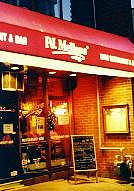
Men & manicotti: P J Mellon's, 489 Church. (In 1999, "Sweet Gary of the famous ears" no longer at PJ's but still often on Church, & still lovely.) |
"I didn't feel a bit detached at Fruit Cocktail. Helen & I really have too few opportunities to be in our community on such a night of celebration & accomplishment."
-- Jane Rule
in Toronto, October 1989
Jane was in town in October for the launch of her seventh novel, After the Fire. This was when I took her and Helen to P J Mellon's to see sweet Gary White of the famous ears.
We had dinner with Paul and David again, though now in a new place. From their original digs on Woodlawn Avenue they had moved for a time to Eglinton and Yonge, far north of downtown. Just after our trip to England in May they moved again, I lending a hand. This time it was a nice second floor flat in a house on South Drive, within walking distance of the ghetto, giving me an easy jaunt across Rosedale Valley for Saturday dinners.
Gerald Hannon threw a quiet party for Jane and Helen while they were here, at his place, much of the old gang there. I had told Jane I could also get tickets for Fruit Cocktail -- likely a less quiet event: the gala benefit for the Lesbian and Gay Community Appeal of Toronto staged on and off since 1983.
It had a cast of hundreds, almost all amateurs. The first surprised us: expecting hokum we got a truly grand event, the entire cast on stage for the closing number, clones and queens and leather dykes all booming out: "Tonight we're gonna sing and dance and have our own show! 'Cause everybody here is gaaay!"
Jane is a lesbian icon, not a role she likes having to play. She would later say that the only kind of role models anyone needs are bad ones: "I certainly don't want to be like that when I grow up!" I was on guard against her being made a public spectacle at Fruit Cocktail. I needn't have been. People were thrilled to see her but, being Canadian, were very polite.
After that she wrote saying that book tours could seem "unreal" to her. "The world does get easier as detachment grows greater."
- Well, some kinds of detachment. I didn't feel a bit detached at Fruit Cocktail. Helen and I really have too few opportunities to be in our community on such a night of celebration and accomplishment. If I'd had to take a public part, I couldn't have felt as one with it.
I was similarly touched at Gerald's with both old and new friends, seeing you there, too, among the people you've worked with for so long.
***

Baby seals? Casey House AIDS Hospice, 9 Huntley St. (So who was Casey?) |
The safest sort of people with AIDS? The ones who are dying: silent, pure; they float; keep them floating long enough & they slowly fade away. Living ones not so infirm could stir up such fuss.
On her 1988 visit Jane had been an honoured guest elsewhere: at Casey House, the AIDS hospice opened that year. It had begun as an ACT project, later spun off as many such ACT initiatives would be. Princess Diana would be a later guest.
The driving force behind Casey House was June Callwood, a journalist, and noted liberal activist since the late '60s, when she stood in the way of cops hauling hippies out of Yorkville and got carted off herself. Later June's liberalism would be challenged in a flap at the Writers' Union, a Black woman calling her racist.
June certainly was not in any practical, political sense. But, more profoundly, her critic may have had a point.
I've never felt that one's heart must be pristine in order to do good in the world; in fact, doubt and reservation -- acknowledged and well pondered -- can sometimes be useful in the effort. But it is often easy for do gooders to annex the suffering of others. It can feel so noble.
A person at ACT (one who should have known better and in time did) once said to me: "I don't know how to work with you." I asked what she meant. "I don't know how to be with you and grieve for you at the same time."
I assured her I wasn't going to die any time soon. (And what's so special about mortality? It's the one thing everybody's got.)
I knew what she was trying to say. But I also knew, in that moment, that her grief took precedence over my death. Or rather, my life. I suppose I wasn't playing well enough the role of "dying person."
***
Among General Idea's art on AIDS, there had been more than oversized AZT. There were also white baby seals, some as I recall carved from Ivory soap.
Baby harp seals were long the favourite cause of good liberals free to embrace these cuddly, sad eyed creatures without regard for the harsh realities of life in the North.
Casey House was built on the image of the baby seals of AIDS. In too many minds they were the safest sort of people with AIDS: the ones who were dying. Living ones less infirm could stir up such fuss. GI's seals were silent, pure: they float; keep them floating long enough and they slowly fade away.
On an opening tour of the place, ACT staff couldn't help note the resources lavished on the dying. Casey House had more staff than ACT, many of them well paid professionals; it was beautifully appointed, many of its spaces done up by prominent designers.
One ACT counsellor, eyeing a sofa with cushions in fine looking fabric, said, "Well, it's lovely -- until somebody shits on it."
They had thought of that at Casey House, replacements at hand, all the fabric washable. These resources were expended on just 12 people at a time, often for a long time. ACT saw hundreds a year.
Casey, for whom the place was named, had been none of those people. He was June Callwood's teenage son, killed in a crash on his motorcycle.
***

Not baby seals: Thanks card from ACT's 1989 donor / member drive: people who came for help ended up helping others. Photos by Norman Hatton (gratis). |
We didn't suck up, never appealed to pity. Pride, self respect, love -- yes. But never smarmy sanctimony, appeals to "charity for those less fortunate." We were all in this together.
My fundraising work at the AIDS Committee of Toronto depended, no less than at Casey House, on appeal to emotions.
I knew the risks. Leftists were wary of anything that smacked of evocative capitalist pitches to sell toothpaste or Levi's. I knew that -- and knew how bad the left could be at raising money.
I'd done it well at TBP, tapping powerful emotions: pride, self respect, love. The pictures in my promo for ACT were of people who were, as we now said, "infected with or affected by HIV / AIDS," not victims but agents in their own and others' lives.
My 1988 membership and donation brochure had on the front only one line: "AIDS is Big." Inside across the top it read: "Together we're BIGGER" -- that last word under the first two and running full width. Beneath was a vast crowd, a photo from Lesbian and Gay Pride Day.
The 1989 campaign featured eight people in individual shots: a woman whose son had died of AIDS; another who was HIV positive as was her husband; five gay men, one a teacher, another a social worker, one Asian, one Deaf, one a genial clone; and a Black woman who worked with immigrants.
All had come to ACT for help. All were now helping others: in support groups, in their jobs, as staff or volunteers at ACT and the Toronto People with AIDS Foundation. All told their stories in their own words. Norman Hatton, famous for images of hot men, had photographed them all, refusing payment.
On the brochures each looked out directly to the viewer, engaging if maybe a bit earnest. On the thank you card all eight appeared again, smiling. Fully opened the piece again made its point in headings, text supporting each one: Knowledge; Strength; Life.
At least three of those eight people, maybe more, are now dead. They did not die baby seals.
***
You can imagine my reaction when, years later, I got a pitch from ACT featuring a letter ostensibly from a volunteer "Buddy." It began, "I remember the last time I saw Dennis."
- The smile was still there -- that same old Dennis smile that could light up the room. But he was so weak ... just like a little child. And thin ... I could count every one of his ribs. His brother and I had to lift him out of the bathtub, he had no strength left in his limbs to do it himself. But he told me he wasn't afraid of dying. He'd accepted that. It was the further suffering and pain that lay in store that worried him.
Dennis died that night. He was 43 years old. He had AIDS.
It had all the hallmarks of a "professional" job: on that Buddy's supposed personal letterhead; full of aching melodrama, those ellipses in the original, each pause ... so ... poignant.
I got that in November 1995, long after I'd left ACT but soon after we got a new Tory government in Ontario, elected on promised tax cuts and soon slashing funds for schools, hospitals, and community health groups. Activists roared in protest. But not ACT, at least not in that letter:
- Nowadays, as public sector funding for all kinds of services is being reduced, you and I are going to have to pick up the slack, instead of focusing on cutbacks.
Maudlin sanctimony for pathetic victims was all of a piece with sucking up to their victimizers, picking up government "slack" in noble appeal to private sector "volunteerism" and charity.
In my time at ACT that letter's true writer would have been turfed. (And after 1995, thankfully was.)
***
We didn't suck up, never appealed to pity. Mind you, mere charity may have motivated some whose sole contribution was the cost of a ticket to a gala benefit.
In 1987 ACT had imported from London, complete with logo, Fashion Cares. By 1989 it had gone down the runway four times (including a Halloween Fashion Scares, a bust), but I doubted its long appeal to people attracted by profession to the flavour of the month.
I was wrong: 1999 would see Fashion Cares XIII. And it did bring variety to the office. Ronnie Richman, a society princess made rich by her man's trade in wedding apparel, might have seemed out of place there -- but for her unabashed Jewishness. Sitting with a bunch of us in the smoking room one day, probably in a some campy moment, she said: "You know what I like about you guys? You never apologize for who you are."
There were other big events I liked better: Dancers for Life, where stars performed free in memory of other dancers already gone to AIDS; From All Walks of Life, where people famous and not got others to pledge money for every kilometre they covered, often all 10, by any means from stroller to wheelchair. They too would still both be on more than a decade later.
But these events could swamp the fundraising office and cost half (or more) of the money they raised. I refused to be sucked in.
With a handful of volunteers I was the only person doing direct mail fundraising, building a mass base we could count on more than one day a year, not just for money but for clout. Politicians paid heed to groups with lots of members -- who could write lots of letters and, if truly miffed, go out on the streets in force.
Compared to events, direct mail cost peanuts: just printing and postage, all the writing, design, envelope stuffing and computer processing done in house. When I started that work in 1987 ACT had 400 members; by 1990 there would be 1,100.
A later fundraising director -- a professional of course, like so many a credentialed charlatan -- would say his job was to raise money, not members. He'd get that figure down to 700.
***
|
"You like that, donchyoo?"
|
He must have thought, fleeing to London: If I don't do this now I may never get another chance. In time he wrote me, saying exactly that.
I'd felt abandoned. But it was hard to be angry with Kevin Hunt.
My ACT office fellows, in a small office, were Denny Young and Kevin Hunt. Denny was a boyishly handsome man who'd come from the United Church Observer. I don't know how his mild camp had gone over there, but it served him well as ACT's volunteer coordinator before he took over as fundraising director (preceding the charlatan).
Kevin, 28, was there on the same short term get 'em off welfare grant I once had to ponder. Like everyone on it who was not female -- single lesbian mothers, they -- he was a gay man with HIV. (If you smell a political minefield here, you're right: within a year ACT would stroll deeper in.)
I liked Denny a lot. And I loved Kevin. Everyone did. In May I had described him to Barry.
- He used to be in the Armed Forces reserves, then he was a plumber; add to this history an outgoing manner and an easy flirtatious streak and you get a sweet, sexy butch stud, black crew cut, big smile and baby browns he can bat with knowing playfulness but -- miracle of miracles -- without attitude. Sounds like you (well, not the batting baby browns; flirting was not your routine).
Still, he is like you in that easy forwardness, that thereness: I'm me, I'm here. I keep thinking I like him because he reminds me of you, but then I realize what I like is that upfront, honest presence, confident, generous of spirit and, because of that, very sexy to me.
One of Kevin's routines was porn star Jeff Stryker's trademark line, if delivered with a smile Stryker couldn't have managed: "You like that, donchyoo?" He'd say it brushing against someone; rubbing my shoulders when I looked tense. I liked it very much.
I would have liked more: he often seemed the big, life saving St Bernard his bone structure suggested. But more often I was his rescuer, or rather his listener: boyfriends could take him for no more than his routine and I often got to hear about it.
Kevin was less a butch stud than a boy, playful but more hesitant, more tentative, than his erotic persona.
***
In a staff meeting that summer we got talking about new treatments. AZT had just hit the news, odd timing I thought, then realized its clinical trial had just wrapped up. Hence the hype.
We saw it with every new drug. Many were the phone calls from parents to people with HIV: Did you hear the news? My mother asked that more than once. I tried to let her down easily, but not much was news to me. Later news that some drug had failed didn't often make the news, at least not on TV.
That meeting's buzz was GLQ 223, Compound Q, a Chinese discovery that -- if it did in the body what it did in a test tube: kill HIV -- might actually be the cure for AIDS.
Later in the smoking room Kevin Hunt gave a sardonic sigh and then with a smile said: "Oh my god, RRSPs!" Few of us planned for retirement. Over Compound Q -- in vitro effects, as ever, rarely matched in life -- we wouldn't have to.
In October Kevin took a vacation, to England. On a card sent to the office he said: I wish I could stay. He did. Immigration was easy: Kevin's father was English. I was angry with him for quite a time, feeling abandoned, betrayed. But I could imagine what he'd thought: if I don't do this now I may never get another chance.
In time he wrote me, saying exactly that. He'd got a job in the Underground, sent a picture of himself in uniform. I scolded him but of course forgave him too; we wrote for some time. It was hard to be angry with Kevin Hunt.
***
On Sunday morning, November 12, Barry called at 8:30 my time, 10:30 pm in Tokyo. His calls were not frequent, lately made well into his night and Barry drunk.
He was just back from a bar. There Randy had walked in with a new boyfriend: now they were Them, Barry alone outside. He had blown up at Randy, telling him to pack his stuff and get out. On the phone he was blubbering, confused, guilt ridden.
Even after that scene Randy tried to renew his visa and stay in Japan. It was the government that finally kicked him out, not Barry. He was back in Toronto by December. Seeing him out one night at Boots I decided sympathy was not in order.
Barry himself had now decided to stay another year in Japan, his visa extended to March 1991. But in March 1990 he would be back in Canada, for three weeks. He asked if I wanted to go for a ride with him then. I certainly did -- a ride and whatever else I could get along the way.
After Randy ditched him I'd asked Barr not to take any vows of monogamy until after his visit here. He said that if he ever did again, I should box his ears.
***
So, he would pull up in that Suzuki Samurai; would say: "Get in! We're off!" And indeed, off we'd be.
All the way to Newfoundland.
Go on to 1990: Jan-Mar / Go back to Contents
This page: http://www.rbebout.com/bar/1989b.htm
December 1999 / Last revised: October 7, 2001
Rick Bébout © 2001 / rick@rbebout.com

